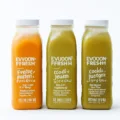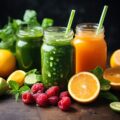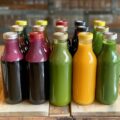The Juicy Journey: From Health Craze to Balanced Perspective
Remember when everyone and their neighbor seemed to be toting around a colorful bottle of freshly pressed juice? The juice trend swept through our culture like a tidal wave of vitamins and antioxidants, promising health, vitality, and a quick fix to our dietary woes. But as with many trends, the initial fervor has settled into a more nuanced understanding. Let’s explore the rise and fall of juice, and discover where this once-ubiquitous beverage stands in our quest for wellness today.
The Sweet Beginnings: How Juice Became a Phenomenon
The juice craze didn’t appear out of thin air. It was born from a genuine desire for healthier lifestyles and a return to whole, natural foods. As people became more health-conscious, the appeal of condensing fruits and vegetables into an easy-to-consume form was undeniable. Juice bars popped up on every corner, and sleek, high-powered juicers became must-have kitchen appliances.
Celebrities and influencers touted the benefits of juice cleanses and detoxes, claiming transformative effects on everything from energy levels to skin clarity. The idea that we could drink our way to better health was intoxicating, and many of us eagerly jumped on the bandwagon.
The Squeeze of Reality: Understanding Juice’s Place in a Balanced Diet
As the initial excitement settled, nutritionists and health experts began to voice concerns. While fruit and vegetable juices do contain vitamins and minerals, they also often pack a hefty dose of natural sugars without the fiber that whole fruits and vegetables provide. This can lead to blood sugar spikes and crashes, and may not be as filling as eating whole produce.
Moreover, the concept of juice cleanses came under scrutiny. Our bodies are remarkably efficient at detoxifying themselves, and there’s little scientific evidence to support the need for liquid-only diets. The realization dawned that juice, while not inherently bad, wasn’t the miracle elixir it had been made out to be.
Finding Balance: The Evolution of Juice in Our Diets
As the pendulum swings back towards moderation, we’re seeing a more balanced approach to juice consumption. Many people now view juice as an occasional treat or a supplement to a varied diet, rather than a meal replacement or cure-all. This shift reflects a broader trend towards mindful eating and a holistic approach to nutrition.
Interestingly, this evolution has led to some positive innovations in the juice world. Cold-pressed juices, which retain more nutrients than traditional methods, have gained popularity. There’s also been a rise in vegetable-forward juices and smoothies that incorporate protein sources and healthy fats, creating more balanced options.
Beyond the Bottle: Embracing Whole Foods and Mindful Consumption
The juice trend, despite its ups and downs, has left us with some valuable lessons. It reminded us of the importance of incorporating fruits and vegetables into our diets and sparked conversations about nutrition that continue to this day. Many people who started their wellness journey with juicing have since expanded their horizons, exploring whole foods cooking, plant-based diets, and other approaches to nourishing their bodies.
Perhaps most importantly, the rise and fall of the juice trend has encouraged us to think critically about health claims and fad diets. It’s a reminder that there are no quick fixes when it comes to health and wellbeing, and that balance and moderation are key.
Juicing Forward: Finding Joy in Mindful Sipping
So where does this leave juice in our current wellness landscape? For many, it’s found a comfortable middle ground. A fresh, homemade juice can be a delightful way to start the day or a refreshing afternoon pick-me-up. The key is to enjoy it mindfully, as part of a varied diet rich in whole foods.
If you do choose to include juice in your routine, consider these tips:
- Opt for mostly vegetable-based juices to minimize sugar content
- Include the pulp when possible to retain fiber
- Pair your juice with a source of protein or healthy fat to balance blood sugar
- Think of juice as a supplement to, not a replacement for, whole fruits and vegetables
- Enjoy the experience – savor the flavors and the nourishment you’re providing your body
Remember, wellness is a journey, not a destination. The juice trend may have ebbed, but it’s left us with a greater awareness of what we put into our bodies and how it affects us. As we continue to learn and grow, let’s approach our food and drink choices with curiosity, compassion, and a healthy dose of common sense.
FAQ: Juicing Questions Answered
1. Is juicing healthier than eating whole fruits and vegetables?
While juicing can be a way to increase your intake of fruits and vegetables, it’s generally not considered healthier than eating whole produce. Whole fruits and vegetables contain fiber, which is often lost in the juicing process. Fiber is important for digestion, feeling full, and stabilizing blood sugar levels.
2. Can juice cleanses help detox the body?
There’s little scientific evidence to support the need for juice cleanses to detox the body. Our liver and kidneys are highly efficient at removing toxins. A balanced diet rich in whole foods is typically more beneficial for overall health than juice cleanses.
3. How often is it okay to drink juice?
This can vary depending on individual health needs and goals. For most people, enjoying juice in moderation – perhaps a few times a week – as part of a balanced diet is fine. It’s always best to consult with a healthcare professional or registered dietitian for personalized advice.
4. What are some healthier alternatives to fruit juice?
Whole fruits, vegetable-based smoothies, infused water, and herbal teas can be great alternatives to fruit juice. These options often provide more fiber and fewer calories while still being refreshing and nutritious.
5. Is homemade juice better than store-bought?
Homemade juice can be a better option as you have control over the ingredients and can consume it immediately, maximizing nutrient content. However, many high-quality, cold-pressed juices are now available commercially. The key is to read labels and choose options with minimal added sugars and preservatives.









